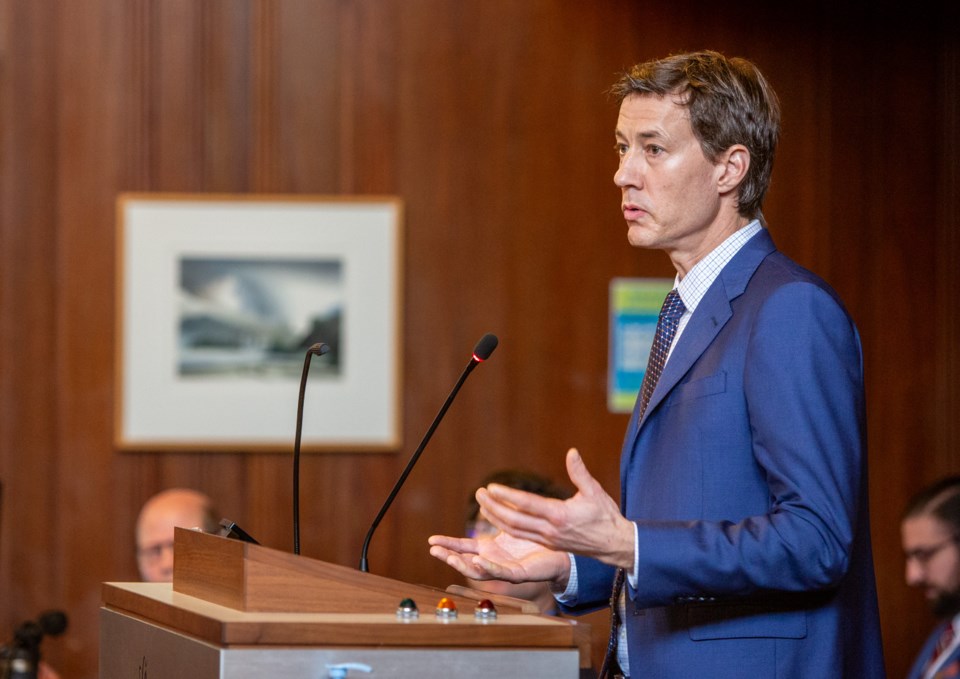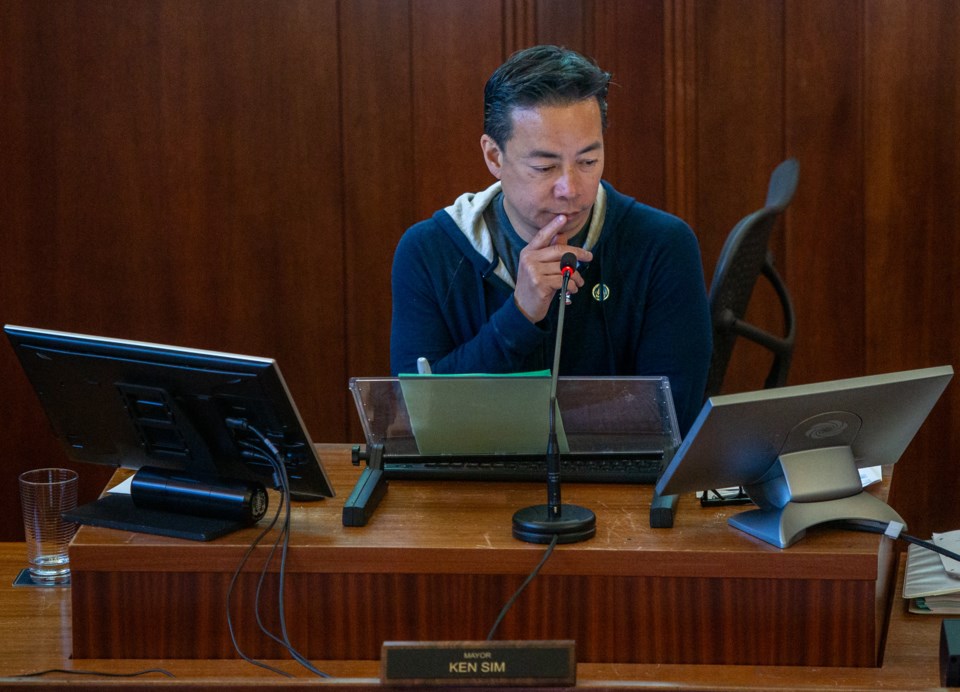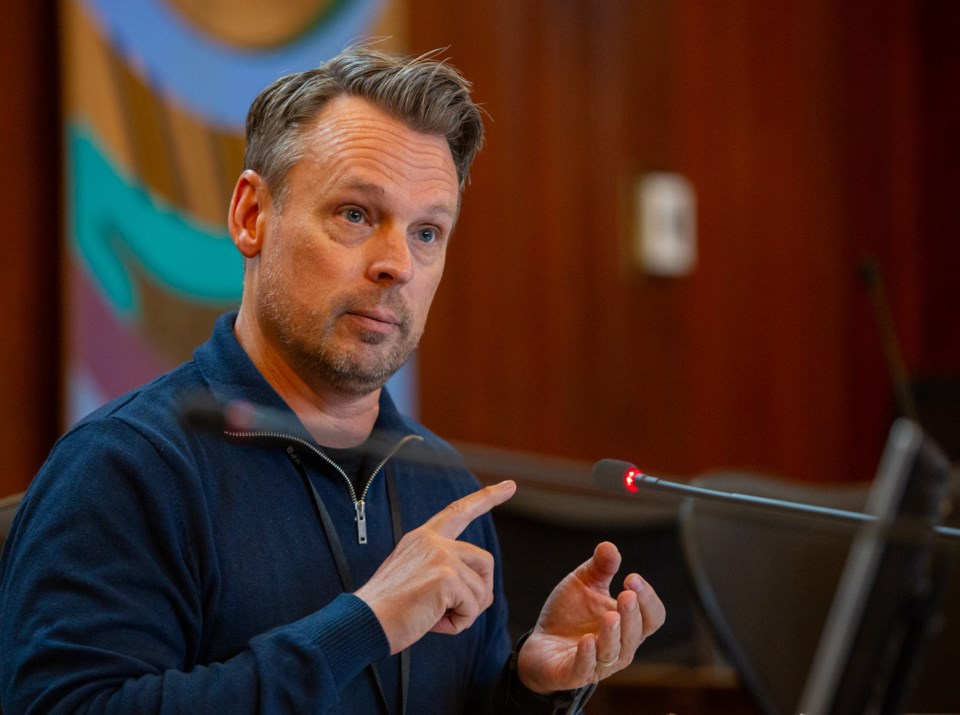Vancouver home builders learned this week that they may soon be allowed again to include natural gas for heating and hot water in construction of new detached homes — a surprising reversal of city policy established in 2022 that aimed to cut carbon pollution.
A bylaw has yet to be enacted but a request from ABC Vancouver Coun. Brian Montague at city hall Tuesday has directed staff to report back to council before Nov. 1, 2024 on a plan to implement the changes.
The move has caused concern by staff tasked with leading strategies to reduce Vancouver’s carbon pollution, with Brad Badelt, the city’s director of sustainability, warning council the policy reversal will negatively affect the city’s climate goals.
“It would set us back potentially tens of thousands of [greenhouse gas emissions],” he said, noting the reversal will also cause confusion in the construction industry over what is permitted in new homes.
“We’ve been pretty careful in signalling changes in the industry. It also has the risk of creating retrofits [from natural gas to electric] in the not-too-distant future.”
Badelt added that progress is being made with BC Hydro over concerns of connecting new homes and multiplexes to electric power. The city has seen processing times for permits reduced, along with requirements for padmounted transformers, he said.
Padmounted transformers change high-voltage electricity to lower voltages for appliances and lighting in a home. The metal boxes are typically located near roads and sidewalks in a neighbourhood, sometimes on a lawn or in a garden.

'Significant barrier'
Montague outlined his reasons for reversing the policy, including the cost of building a house solely powered by electricity, giving builders a choice of natural gas or electrification and potentially unlocking more home construction.
He said the city’s “well-intentioned” policy from 2022 to only allow natural gas in new homes for cooking and powering a fireplace translates to a negative effect on affordability, both for builders and potential renters or buyers.
“Many of those costs will be passed directly to — or will trickle down — to seniors, renters and those who can least afford them,” he said. “Limiting energy options is a significant barrier to creating more housing, especially much-needed missing middle and multiplex housing because the costs are being driven way too high.”
Five of Montague’s ABC colleagues, including Mayor Ken Sim, agreed with his argument.
The support resulted in a 6-5 vote that saw ABC councillors Peter Meiszner and Lisa Dominato split from their party and vote in opposition with OneCity’s Christine Boyle and the Greens’ Adriane Carr and Pete Fry.
“I'm a little astonished that we're even having this debate, to be honest,” said Fry, noting the years of work staff committed to developing climate plans. “It does really boggle my mind because I have yet to see an actual, sort of tangible qualification that suggests this is somehow more affordable or less affordable.”
'Greenhouse gas emissions worsening'
Dominato said new home construction is “the low hanging fruit” for electrification.
“Today, I don’t think is the time to roll back on our regulations, particularly as we see greenhouse gas emissions worsening and impacting our climate and biodiversity,” she said.
Meiszner acknowledged a point Montague made about BC Hydro’s capacity to supply electricity for residents who transfer from natural gas, but he said he had concerns about “taking a step backwards” in reversing the policy.
The council debate came after a presentation that showed staff’s climate change-fighting work cut community-wide carbon pollution by 17 per cent since 2007. The reduction happened at the same time the city’s population grew by 15 per cent and the economy by 60 per cent.
The majority of Vancouver’s carbon pollution — 55 per cent — comes from natural gas use in homes and buildings. Another 40 per cent of emissions are generated by gas-powered vehicles.

'Not giving up on reducing our carbon footprint'
To reach its goal of reducing carbon pollution by 50 per cent by 2030, the city has adopted a series of plans and policies aimed at achieving new zero emission buildings. Staff, however, acknowledged reaching the 50 per cent goal is unlikely, but progress is still being made.
It was a point Montague seized on in an interview with Glacier Media, noting he has heard repeatedly from staff that such a target is unreachable.
“It's silly and a bad idea to chase unattainable targets with bad policy,” he said. “Let's find another path. Technology is quickly catching up with renewable natural gas. To say that electrification is the only path, I just don't agree with that.”
The mayor, who appeared at the council the meeting via a video link from the United Kingdom, said Montague’s motion strikes a balance between protecting the environment and the need for housing.
“We're not giving up on reducing our carbon footprint as a city,” Sim said.
In an exchange with Badelt, the mayor said he had spoken to many home builders who won’t build in Vancouver anymore “because the numbers just don’t pan out.” Badelt said that is not staff’s experience with multiplexes.
“Multiplexes are going quite well,” he said.
“We don't see an issue with builders being reluctant to build them at this point. I would also add that the [padmounted transformer] cost, which is the one that you will hear about, is built into that pro forma. So when they do not need to build the [transformer], they're actually coming out quite a bit ahead of what was projected.”
Sean Pander, the city’s manager of green and resilient buildings, said the upfront costs to build a low carbon home are somewhat higher than one fitted with natural gas.
“It's true — you've got more insulation, you've got the added technology,” Pander told council.
“[But] as you move to a more efficient building and a more efficient heating system, the amount of energy you need goes down quite a bit. So you're using more expensive energy, but the overall cost of ownership is relatively unchanged as compared to what the requirements were back in 2007.”
Energy source data for Vancouver buildings
Here is a rough breakdown of energy sources for Vancouver’s current building stock, according to building type, as shared in a memo to council by the city’s planning, urban design and sustainability department:
• For detached and semi-detached: 10 per cent primarily use electricity, 90 per cent use gas
• For commercial buildings: 18 per cent primarily use electricity, 81 per cent use gas, one per cent use district heating.
• Multi-unit residential buildings: 15 per cent use primarily electricity, 83 per cent use gas, two per cent use district heating.
The BC Coalition for Affordable Energy issued a news release Wednesday, saying it strongly supports the Montague-led decision.
“Vancouver city council has now made a wise decision to give consumers and builders the choice of whether to use electric or renewable natural gas and natural gas in new buildings after seeing that we need affordable and dependable energy choices at a time when B.C. is suffering serious electricity shortfalls and impending higher costs,” said Bill Tieleman, director of the coalition.
Tieleman noted that BC Hydro imported $500 million in electricity last year — 20 per cent of its total electricity — “and this year looks even worse” due to snowpack and river levels at their lowest since 1970.
The release included quotes from leaders of the BC Restaurant and Foodservices Association, Canadian Federation of Independent Business, Hearth, Patio & Barbecue Association of Canada, the Alliance of Beverage Licensees BC and Surrey Board of Trade.
Zero carbon step code
“The BC Coalition for Affordable Dependable Energy is advocating for a measured approach that doesn’t negatively impact businesses and families across B.C. and this Vancouver decision reflects that,” Tieleman added.
In May 2023, British Columbia released the Zero Carbon Step Code, which sets the path for all new buildings to be zero carbon by 2030. Council is expected to get a staff report this November to consider adopting the code.
Vancouver’s current requirements for most new buildings align with level three (of four) of the code, while highrises align with level two. For context, Nanaimo, Victoria, Saanich, Esquimalt, Colwood, Whistler, Burnaby and others have approved or adopted the top level.





